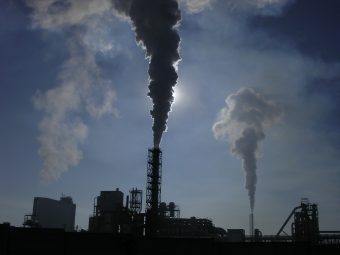
Last month, the United Nations General Assembly passed a historic resolution declaring access to a healthy environment a universal human right.
The resolution has been lauded around the world in recent weeks, raising hopes it will prod governments to tackle a host of long-neglected environmental problems.
At the top of the list for environmental campaigners is air pollution, which is responsible for nearly 10 percent of all global deaths.
“The resolution will empower people to claim their rights to a healthy environment,” said Soo-Young Hwang, a Legal Officer with the United Nations Environment Programme (UNEP). “And the right to breathe clean air is an integral component of the right to a healthy environment.”
Hwang made the comments ahead of the International Day of Clean Air for blue skies, which is designed to raise awareness about the dangers of air pollution.
Precedent-setting
The UN General Assembly resolution, which passed by a 161-0 vote on 28 July, is not legally binding on UN Member States. But its backers say it will have a profound effect on people’s understanding of their rights and encourage states to implement national laws and regional treaties that safeguard the environment.
Air pollution is one of the world’s gravest threats to public health, causing an estimated seven million people to die prematurely every year. While air pollution is a global threat, it is developing countries that suffer the most due to a reliance on wood and other solid fuels, like coal, for cooking and heating. And even within developing countries, the crisis is felt most acutely by low-income and marginalized communities.
Air pollution also takes a heavy economic toll: according to the World Bank, in 2019 alone, it cost the world economy USD8.1 trillion, equivalent to 6.1 percent of global gross domestic product.
More:
Those who have championed the UN General Assembly resolution say that it will help citizens, especially the poor, demand better air quality from governments and multinational corporations that pollute the environment.
Even before the resolution was passed, citizens, civil society groups and conservationists from Brazil to Indonesia have increasingly been using rights-based litigation to demand environmental justice, including the right to clean air.
In March of this year, the High Court of South Africa recognized the “poor air quality in South Africa’s Mpumalanga Highveld region as a breach of residents’ constitutional right to an environment that is not harmful to their health and well-being.”
National impact
Renée Gift, a Legal Officer with UNEP, said the General Assembly resolution could push more states to develop and enforce national outdoor air quality standards, which she called “integral” to ensuring clean air.

According to UNEP’s first global assessment of air pollution legislation in 2021, one-third of the world’s countries have no legally-mandated ambient air quality standards. And in many cases, even when these standards exist, they are not adhered to.
The recognition of the right to clean air at the national level would also create a strong basis for litigation against governments that fail to uphold air quality standards. This is already taking place in many jurisdictions and is likely to increase as a result of the resolution.
There are hopes the General Assembly declaration will have the same impact as a 2010 resolution declaring access to clean water a human right. “What happened with that resolution is that it compelled countries to review their legislation at the national level,” said Hwang.
“What that meant was that water had to be accessible, it had to be affordable, and it had to integrate non-discrimination clauses. This has changed a lot of people’s lives, especially low income people,” she added.
Ultimately, the hope is that the most recent UN General Assembly resolution will not only move the needle on environmental rule of law and the implementation of multilateral environmental agreements on air quality but that it will empower citizens of the world to demand their right to breathe clean air.
As David Boyd, the UN Special Rapporteur on Human Rights and the Environment, said, “having a right to a healthy environment changes people’s perspective from begging to demanding governments to act.”
Source: UNEP

